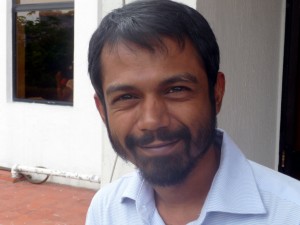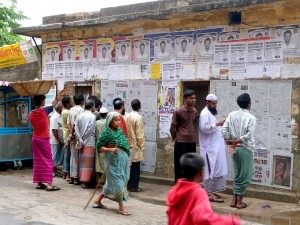Japan through the news lens of Bangladesh
By Taufique Ahmed, Dhaka, Bangladesh
 Bangladesh is shocked by what has happened in Japan. People here have closely followed the news to get the latest updates from newspapers, TV, radio and online.
Bangladesh is shocked by what has happened in Japan. People here have closely followed the news to get the latest updates from newspapers, TV, radio and online.
It’s very tough for the media to handle what’s happening in Japan, as there is also another big issue that the people of Bangladesh worry about very much. Many people here are still taken aback by the latest events in Libya, because many Bangladeshis live and work there and have now become victims of the uprising in this North African country.
Japan's tsunami and earthquake are still important news in Bangladesh, as this country is also one of the sufferers of climate change. Nonetheless, Japan's nuclear crisis is also getting attention in the newspapers and at TV and radio stations here as the situation worsens.
Audiences wanted more than radio and TV could deliver
 Government-owned radio and TV treated the triangle of disaster, i.e. earthquake, tsunami and nuclear catastrophe, in a diplomatic way. They were not doing any in-depth reporting asking why Japan was actually facing this disaster. They only covered the consequences in Japan that seemed unusual. Most of the people didn’t follow these stations.
Government-owned radio and TV treated the triangle of disaster, i.e. earthquake, tsunami and nuclear catastrophe, in a diplomatic way. They were not doing any in-depth reporting asking why Japan was actually facing this disaster. They only covered the consequences in Japan that seemed unusual. Most of the people didn’t follow these stations.
TV stations couldn’t properly cover the disaster relief efforts in Japan – news on food, shelter and medication for the survivors of the disaster. Instead, viewers were always taken to the story of how the nuclear reactor burst. But that wasn’t what the audience wanted. Almost everyone was trying to find out how the survivors were actually getting through this tough time.
Radios didn’t play that much of a role in this completely traumatic situation. They were only covering regular news without any breaking news updates. But whenever they did, it was all about the nuclear crisis or radiation leaks and about the death toll.
Newspapers do in-depth reporting
Bangladesh's newspapers, however, brought some insight about the disaster in Japan. They ran some probing articles, interviewed environment specialists, and presented the history of earthquakes in Japan.
 The newspapers gave the tsunami more attention than the electronic media. They also asked the question how Bangladesh could tackle such a big disaster – what if Bangladesh was in place of Japan? People liked these kinds of articles more than what was actually happening at the reactors.
The newspapers gave the tsunami more attention than the electronic media. They also asked the question how Bangladesh could tackle such a big disaster – what if Bangladesh was in place of Japan? People liked these kinds of articles more than what was actually happening at the reactors.
In Bangladesh, newspapers principally rule the media. People all across the country devote most of their time to reading the papers.
As Bangladesh is vulnerable to earthquakes and other natural disasters, newspapers ran big stories about the earthquake, pointing out particulars of such a disaster.
Nevertheless, there still are not many stories on rescue efforts, even though people would like to hear more from survivors and how they experienced everything.
The people of Bangladesh were always checking the numbers of casualties and homeless people. They were really shocked and left condolence messages in newspapers or called different news offices to know more about the number of people who died.
People got very anxious seeing the pictures on TV of the tsunami waves crushing the city of Sendai.
Beside the local media, they particularly followed the live footage on BBC and CNN; on the other hand, journalists and a particular group who consume online media, stayed updated via mobile and the web.
The crisis at the Fukushima nuclear plant takes center stage
The nuclear issue became stronger in Bangladeshi newspapers as the story developed. Graphic images of the reactors showing what actually happened made the people more curious. Even in the tea-stalls, people shared their views on such a critical issue, which they did not even know about before seeing those images.
Right now, all the news media are trying to focus on how Japan will actually recover from this great loss, as people are very much eager to know more about Japan’s future.
Photo credits:
People reading news pasted on wall in Old Dhaka by flickr / Sandy & Alan , courtesy of Creative Commons license
"Dhaka Daily News" by flickr / joiseyshowaa, courtesy of Creative Commons license
3 Comments




Shabbir Uddin Ahmed | Monday 2011-04-04
A splendid job done by Toufique. I believe this will lead to a new imension of reporting. I want Toufique to write more on the real need of the readers and suggest news papers and media to act accordingly.
Thanks Towfique for initiating such ideas. Keep it up and hope to see more articles in future.
Shabbir
HAR Jewel | Tuesday 2011-04-05
good job bro . keep it up
Taufique | Monday 2011-04-11
Thank you very much for your comments.
I’d try to contribute, the best I can afford. It’s always a great feeling to represent Asia/Bangladesh through Deutsche Welle, as they’ve given me this opportunity.
Many thanks for going through the article.